最新最全小学英语作文写作方法指导及范文(精华版)
小学英语作文写作技巧及范文
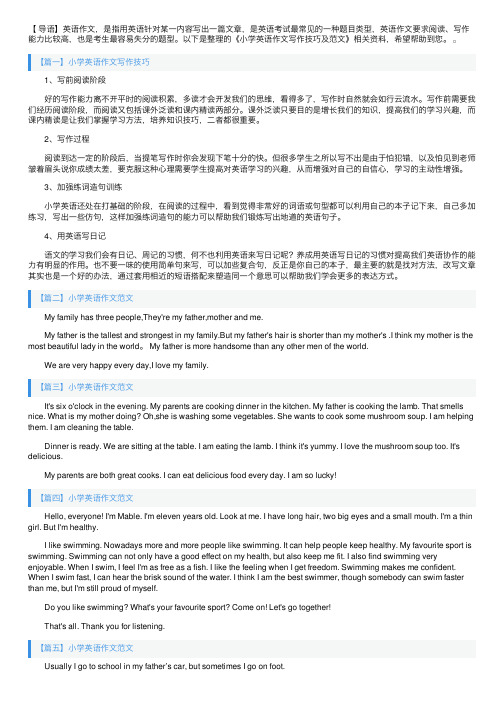
【导语】英语作⽂,是指⽤英语针对某⼀内容写出⼀篇⽂章,是英语考试最常见的⼀种题⽬类型,英语作⽂要求阅读、写作能⼒⽐较⾼,也是考⽣最容易失分的题型。
以下是整理的《⼩学英语作⽂写作技巧及范⽂》相关资料,希望帮助到您。
【篇⼀】⼩学英语作⽂写作技巧 1、写前阅读阶段 好的写作能⼒离不开平时的阅读积累,多读才会开发我们的思维,看得多了,写作时⾃然就会如⾏云流⽔。
写作前需要我们经历阅读阶段,⽽阅读⼜包括课外泛读和课内精读两部分。
课外泛读只要⽬的是增长我们的知识,提⾼我们的学习兴趣,⽽课内精读是让我们掌握学习⽅法,培养知识技巧,⼆者都很重要。
2、写作过程 阅读到达⼀定的阶段后,当提笔写作时你会发现下笔⼗分的快。
但很多学⽣之所以写不出是由于怕犯错,以及怕见到⽼师皱着眉头说你成绩太差,要克服这种⼼理需要学⽣提⾼对英语学习的兴趣,从⽽增强对⾃⼰的⾃信⼼,学习的主动性增强。
3、加强练词造句训练 ⼩学英语还处在打基础的阶段,在阅读的过程中,看到觉得⾮常好的词语或句型都可以利⽤⾃⼰的本⼦记下来,⾃⼰多加练习,写出⼀些仿句,这样加强练词造句的能⼒可以帮助我们锻炼写出地道的英语句⼦。
4、⽤英语写⽇记 语⽂的学习我们会有⽇记、周记的习惯,何不也利⽤英语来写⽇记呢?养成⽤英语写⽇记的习惯对提⾼我们英语协作的能⼒有明显的作⽤。
也不要⼀味的使⽤简单句来写,可以加些复合句,反正是你⾃⼰的本⼦,最主要的就是找对⽅法,改写⽂章其实也是⼀个好的办法,通过套⽤相近的短语搭配来塑造同⼀个意思可以帮助我们学会更多的表达⽅式。
【篇⼆】⼩学英语作⽂范⽂ My family has three people,They're my father,mother and me. My father is the tallest and strongest in my family.But my father's hair is shorter than my mother's .I think my mother is the most beautiful lady in the world。
小学英语作文写作技巧(附范文)
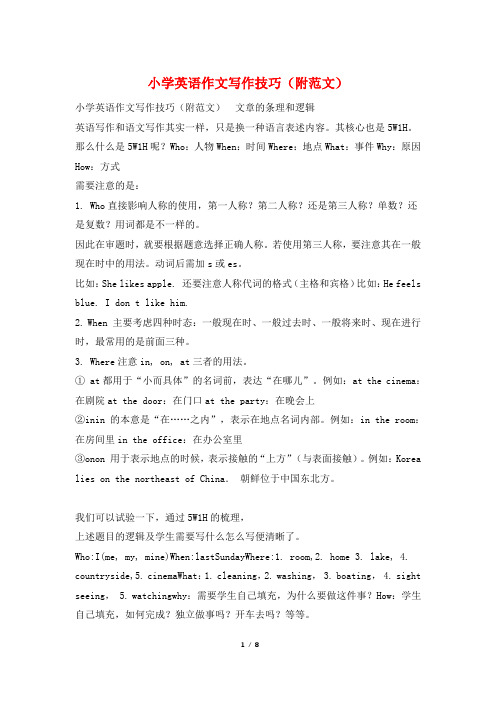
小学英语作文写作技巧(附范文)小学英语作文写作技巧(附范文)文章的条理和逻辑英语写作和语文写作其实一样,只是换一种语言表述内容。
其核心也是5W1H。
那么什么是5W1H呢?Who:人物When:时间Where:地点What:事件Why:原因How:方式需要注意的是:1. Who直接影响人称的使用,第一人称?第二人称?还是第三人称?单数?还是复数?用词都是不一样的。
因此在审题时,就要根据题意选择正确人称。
若使用第三人称,要注意其在一般现在时中的用法。
动词后需加s或es。
比如:She likes apple. 还要注意人称代词的格式(主格和宾格)比如:He feels blue. I don t like him.2. When 主要考虑四种时态:一般现在时、一般过去时、一般将来时、现在进行时,最常用的是前面三种。
3. Where注意in, on, at三者的用法。
① at都用于“小而具体”的名词前,表达“在哪儿”。
例如:at the cinema:在剧院at the door:在门口at the party:在晚会上②inin 的本意是“在……之内”,表示在地点名词内部。
例如:in the room:在房间里in the office:在办公室里③onon 用于表示地点的时候,表示接触的“上方”(与表面接触)。
例如:Korea lies on the northeast of China.朝鲜位于中国东北方。
我们可以试验一下,通过5W1H的梳理,上述题目的逻辑及学生需要写什么怎么写便清晰了。
Who:I(me, my, mine)When:lastSundayWhere:1. room,2. home 3. lake, 4. countryside,5. cinemaWhat:1. cleaning,2. washing, 3. boating, 4. sight seeing, 5. watchingwhy:需要学生自己填充,为什么要做这件事?How:学生自己填充,如何完成?独立做事吗?开车去吗?等等。
小学英语写事作文指导
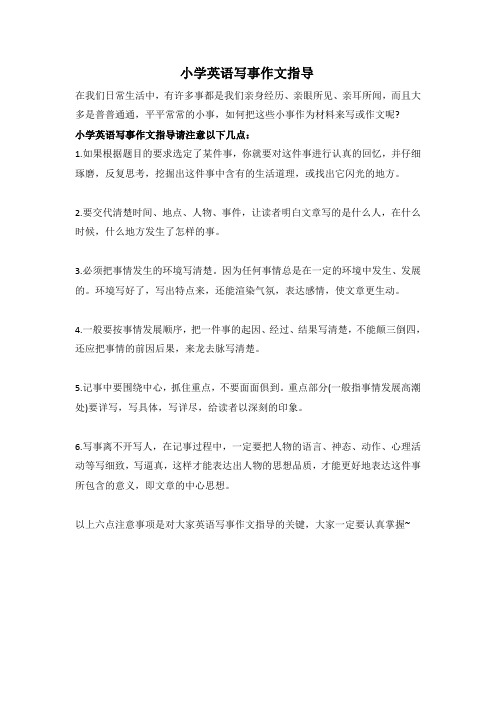
小学英语写事作文指导
在我们日常生活中,有许多事都是我们亲身经历、亲眼所见、亲耳所闻,而且大多是普普通通,平平常常的小事,如何把这些小事作为材料来写或作文呢?
小学英语写事作文指导请注意以下几点:
1.如果根据题目的要求选定了某件事,你就要对这件事进行认真的回忆,并仔细琢磨,反复思考,挖掘出这件事中含有的生活道理,或找出它闪光的地方。
2.要交代清楚时间、地点、人物、事件,让读者明白文章写的是什么人,在什么时候,什么地方发生了怎样的事。
3.必须把事情发生的环境写清楚。
因为任何事情总是在一定的环境中发生、发展的。
环境写好了,写出特点来,还能渲染气氛,表达感情,使文章更生动。
4.一般要按事情发展顺序,把一件事的起因、经过、结果写清楚,不能颠三倒四,还应把事情的前因后果,来龙去脉写清楚。
5.记事中要围绕中心,抓住重点,不要面面俱到。
重点部分(一般指事情发展高潮处)要详写,写具体,写详尽,给读者以深刻的印象。
6.写事离不开写人,在记事过程中,一定要把人物的语言、神态、动作、心理活动等写细致,写逼真,这样才能表达出人物的思想品质,才能更好地表达这件事所包含的意义,即文章的中心思想。
以上六点注意事项是对大家英语写事作文指导的关键,大家一定要认真掌握~。
小学456年级如何写好英文作文范文
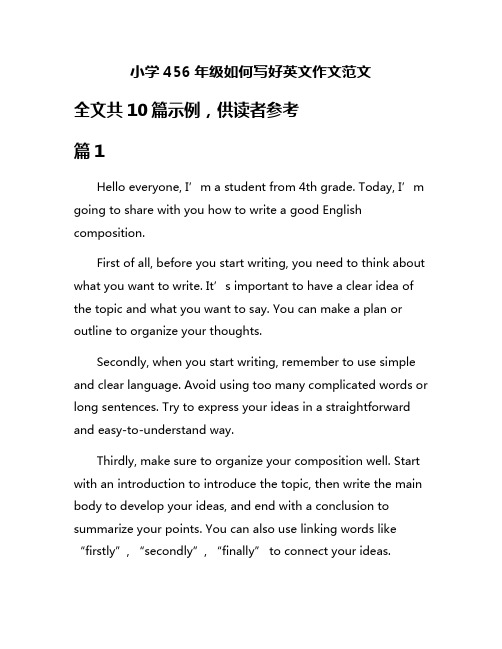
小学456年级如何写好英文作文范文全文共10篇示例,供读者参考篇1Hello everyone, I’m a student from 4th grade. Today, I’m going to share with you how to write a good English composition.First of all, before you start writing, you need to think about what you want to write. It’s important to have a clear idea of the topic and what you want to say. You can make a plan or outline to organize your thoughts.Secondly, when you start writing, remember to use simple and clear language. Avoid using too many complicated words or long sentences. Try to express your ideas in a straightforward and easy-to-understand way.Thirdly, make sure to organize your composition well. Start with an introduction to introduce the topic, then write the main body to develop your ideas, and end with a conclusion to summarize your points. You can also use linking words like “firstly”, “secondly”, “finally” to connect your ideas.Moreover, pay attention to grammar and punctuation. Make sure to use proper grammar and punctuation marks such as full stops, commas, and capital letters. Also, check your spelling to avoid any mistakes.Lastly, read over your composition to make sure it makes sense and flows well. Ask a friend or teacher to read it and give you feedback. This can help you improve your writing skills.In conclusion, writing a good English composition is not as difficult as you think. With practice and patience, you can improve your writing skills. Just remember to plan ahead, use simple language, organize your ideas, check your grammar and punctuation, and revise your work. Good luck, everyone!篇2Title: How to Write a Good English Composition for Grade 4,5,6Hey guys! Today, I'm gonna tell you all about how to write a super awesome English composition. Are you ready? Let's get started!First, you gotta have a good topic. It could be about your favorite animal, a fun trip you went on, or even a cool dream youhad. Remember, the topic should be something you really like, so you can write about it with lots of enthusiasm.Next, you need to plan your writing. Make a list of all the things you want to say in your composition. It could be the main points of your story or some interesting details you want to include. Planning helps you stay organized and makes your writing flow better.Now, it's time to start writing! Remember to have an introduction, where you introduce your topic, a body, where you explain everything in detail, and a conclusion, where you wrap up your composition nicely. Don't forget to use different sentence structures and vocabulary to make your writing interesting.After you finish writing, take a break and then come back to revise. Check for any spelling or grammar mistakes, and see if there's anything you want to add or change. It's important to revise your work to make it the best it can be.And there you have it - a super awesome English composition! Just remember to have fun with your writing and let your creativity shine. Keep practicing and you'll be a great writer in no time. Good luck, guys!篇3Hello everyone! Today I am going to share with you some tips on how to write a good English composition for students in 4th, 5th and 6th grade. Writing a good composition can be challenging, but with some practice and guidance, you can improve your writing skills.First of all, it is important to choose a topic that you are interested in and familiar with. This will make it easier for you to write and will also make your composition more engaging. You can choose a topic based on your hobbies, interests, or experiences.Next, it is important to make a plan before you start writing. Think about the main ideas you want to include in your composition and the order in which you want to present them. You can create an outline to help you organize your thoughts.When writing your composition, make sure to use proper grammar, punctuation, and spelling. It is also important to use a variety of sentence structures and vocabulary to make your composition more interesting and engaging. You can also use transition words to connect your ideas and make your composition flow smoothly.After you have finished writing your composition, take some time to revise and edit it. Check for any errors in grammar,punctuation, or spelling, and make sure that your ideas are presented clearly and cohesively. You can also ask a teacher or classmate to read your composition and provide feedback.In conclusion, writing a good English composition takes practice and patience. By choosing a topic you are interested in, making a plan, using proper grammar and vocabulary, and revising your work, you can improve your writing skills and create a strong composition. Keep practicing and don't be afraid to make mistakes – that's how we learn and grow as writers. Good luck!篇4Title: How to Write a Good English Composition for Grade 4, 5, 6Hey guys, do you struggle with writing English compositions in school? Don't worry, I'm here to help you out! I'm going to give you some tips on how to write a really good English composition for Grade 4, 5, or 6. Let's get started!First of all, make sure you understand the topic. Read the question carefully and make sure you know what you are being asked to write about. If you are not sure, ask your teacher forclarification. It's important to know what you are writing about before you start.Next, make a plan. Think about what you want to say in your composition and organize your ideas. You can make a mind map or a list of key points to help you structure your writing. This will make it easier to write a well-organized composition.Now, start writing! Begin with an introduction that introduces the topic and grabs the reader's attention. Then, write the body of your composition, where you explain your ideas and provide examples to support your points. Finally, write a conclusion that summarizes your main points and leaves the reader with a strong final impression.Remember to use good vocabulary and varied sentence structures in your writing. This will make your composition more interesting to read. Also, check your spelling and grammar before you finish - you don't want to make any silly mistakes!Lastly, practice makes perfect. The more you practice writing English compositions, the better you will get. Ask your teacher for feedback on your work so you can improve. Don't give up, keep writing and you will see progress!In conclusion, writing a good English composition for Grade 4, 5, or 6 is all about understanding the topic, making a plan, organizing your ideas, and practicing. Follow these tips and you will be on your way to becoming a great writer! Good luck!篇5Tips for Writing a Good English CompositionHey guys, do you struggle with writing English compositions? Don't worry, I've got some tips to help you write a great essay! Follow these steps and you'll be an English composition expert in no time.First, you need to make sure you understand the topic. Read the question carefully and make sure you know what you are supposed to write about. If you don't understand something, ask your teacher for help.Next, you need to plan out your essay. Think about what points you want to make and how you can support them with examples or evidence. You can use a brainstorming web or outline to organize your ideas before you start writing.When you start writing, make sure you have a clear introduction. Your introduction should grab the reader'sattention and introduce the main idea of your essay. You can use a quote, a question, or an interesting fact to start your essay off.In the body of your essay, make sure each paragraph focuses on one main idea. Start with a topic sentence that introduces the main point of the paragraph, and then support that point with examples and details. Make sure your paragraphs arewell-organized and easy to follow.In the conclusion of your essay, summarize the main points you have made and restate your thesis. You can also end with a strong closing statement, or leave the reader with something to think about.Finally, don't forget to proofread your essay before you turn it in. Check for spelling and grammar errors, and make sure your ideas are clear and well-expressed. You can also ask a friend or family member to read your essay and give you feedback.So there you have it, follow these tips and you'll be writing awesome English compositions in no time. Good luck!篇6Title: How to Write a Good English Composition in 4th, 5th, and 6th GradeHey guys! Do you want to know how to write a really good English composition? It's super easy and fun! In this article, I'll teach you some tips and tricks on how to write a great English composition in 4th, 5th, and 6th grade.First things first, before you start writing your composition, make sure you understand the topic. Read the instructions carefully and think about what you want to write. You can even make a quick outline to organize your ideas.Next, try to use interesting vocabulary and phrases in your composition. Don't be afraid to use new words or expressions you've learned in class. It will make your composition more colorful and exciting!Remember to use proper grammar and punctuation. Check your spelling and make sure your sentences are clear and easy to understand. You can also ask a teacher or parent to help you proofread your composition.Lastly, be creative and have fun with your writing! You can add details, descriptions, or even dialogues to make your composition more engaging. Don't forget to write a good introduction and conclusion to wrap up your ideas.So, there you go! Follow these tips and you'll be on your way to writing a perfect English composition. Good luck and happy writing!篇7Hey guys, do you wanna know how to write a super awesome English composition? Well, in this article, I'm gonna tell you some tips on how to write a great English essay in 4th, 5th, or 6th grade!First of all, before you start writing, make sure you understand the topic. Read the instructions carefully and think about what you want to say. Then, make an outline of your essay. Write down your ideas and organize them into paragraphs. Remember to have an introduction, body paragraphs, and a conclusion.Next, start writing your essay. In the introduction, you can start with a hook to grab the reader's attention. You can use a question, a quote, or an interesting fact. Then, introduce the topic and let the reader know what your essay will be about.In the body paragraphs, you should develop your ideas and provide examples to support your points. Use transition words like "first," "next," and "finally" to show the progression of yourideas. Make sure each paragraph focuses on one main idea and supports it with evidence.Finally, in the conclusion, summarize your main points and restate your thesis statement. You can also end with athought-provoking question or a call to action to engage the reader.Remember to check your spelling and grammar before you finish. It's also a good idea to have someone else read your essay to make sure it makes sense.With these tips, you'll be on your way to writing a super awesome English composition that will impress your teacher and classmates. So, get your pencil ready and start writing! Good luck!篇8Hello everyone! Today I'm going to tell you how to write a great English composition in 4th, 5th, and 6th grade. Writing an English composition may seem difficult, but with the right tips and practice, you can write an amazing essay!First, let's start with an introduction. In your introduction, you should introduce the topic of your essay and grab thereader's attention. You can start with a question, a quote, or a fun fact. For example, if you are writing about your favorite holiday, you can start with "Have you ever wondered what makes Christmas so special?".Next, you should write your body paragraphs. In your body paragraphs, you should include your main ideas and support them with details and examples. Each paragraph should focus on one main idea, and you should use transition words like "first", "next", and "finally" to help guide your reader through your essay.After your body paragraphs, you should write a conclusion. In your conclusion, you should summarize your main points and leave the reader with a final thought. You can restate your thesis or end with a powerful statement. For example, if you are writing about your favorite book, you can end with "Reading is not just a hobby, it's a journey to new worlds".Remember to check your grammar and spelling when you are done writing. You can ask a teacher or parent to help you proofread your essay. Practice writing regularly to improve your writing skills and don't be afraid to experiment with different styles and topics.I hope these tips help you write amazing English compositions! Good luck and happy writing!篇9Title: How to Write a Good English Composition in 4th, 5th, and 6th GradeHey everyone! Do you want to know how to write a super awesome English composition in 4th, 5th, and 6th grade? Well, you're in luck because I'm going to give you some helpful tips!First, you need to come up with a great topic. Think about something that you are interested in or passionate about. It could be a story about your summer vacation, a funny experience you had, or even a made-up adventure with your favorite superhero.Next, make sure to organize your ideas. Start with an introduction that hooks the reader and tells them what your composition is about. Then, write a few paragraphs with your main points. Make sure each paragraph has a topic sentence and supporting details. Finally, end with a conclusion that wraps everything up nicely.Don't forget to use descriptive language and colorful adjectives to make your composition more interesting. Paint a picture with your words and make your reader feel like they are right there with you.Lastly, remember to proofread your work. Check for spelling and grammar mistakes, and make sure your sentences flow smoothly. You can also ask a friend or teacher to read your composition and give you feedback.So there you have it, a few tips on how to write a good English composition in 4th, 5th, and 6th grade. Just remember to have fun with it and let your imagination run wild! Happy writing!篇10Hey guys, have you ever wondered how to write a good English essay in the 4th, 5th or 6th grade? Well, today I'm gonna share some tips with you on how to write an awesome English essay!First of all, make sure you understand the topic. Read the question carefully and think about what the essay is asking you to write about. If you're not sure, ask your teacher for help. It's important to have a clear understanding of what you're writing about before you start.Next, make a plan. Before you start writing, jot down some key points or ideas you want to include in your essay. This will help you stay organized and make sure you cover all the important points.When you start writing, remember to use proper grammar and punctuation. Make sure your sentences are clear and concise. Avoid using slang or informal language in your essay.Also, don't forget to use transitional words and phrases to help connect your ideas and make your essay flow smoothly. Words like "firstly, secondly, in addition, however, therefore" can help make your writing more cohesive.Finally, don't be afraid to ask for feedback. Show your essay to a teacher, parent, or friend and ask for their input. They may have some helpful suggestions for improvement.So there you have it, guys! Follow these tips and you'll be on your way to writing great English essays in no time. Good luck!。
小学英语写作技巧

小学英语作文一般有以下的题型:1、根据表格写话;2、看图写话;3、根据给出的提示词写话等。
大多数是50到100个单词左右。
但是小学生的词汇量、语法知识有限,故在写作中有一定的难度。
以下介绍写作的几种技巧,目的在于帮助学生减少在用词、语法、拼写、标点等语言方面的错误,提高写作水平。
一、回忆法。
审清题目的要求后,回忆一下与之相关的课文内容,再动笔。
如: My family’s hobby 一词,要求写清楚你的家庭成员的爱好。
首先出现在你的脑海里的你所背诵过的呢课文里的句子。
具体内容尽量用上自己最熟悉的词来组织。
如课文里的句子根据自己的实际情况改编。
从而避免单词拼写的错误。
二、朗读法。
写完文章后,反复朗读自己所写的文章。
这样会使你对作文有一个全新的感受。
你会在写作时可能出现的错误,如句子不通顺,单词拼写错误等,然后改正。
三、记录错误法。
一个小本子。
每次老师把批改过的作文发回来时,仔细阅读老师指出的错误,把错误抄在本子上,并在旁边写上正确的形式。
然后在每次写作文前,对照本子的错误,检查自己文中是否出现了相同或是类似的错误,以便及时改正。
四、同伴批改法。
学生可以找自己的同学互相交换作文批改。
对照检查错误。
这样,在帮助同学找出错误的过程中,自己也受益匪浅。
英语写作是一种创作性的学习过程。
启动知识信息储存,构思立意,谋篇布局,遣词造句,对语言表达的正确性和准确性、思维的逻辑性和文章的条理性都比口语要求更高。
通常英语写作有以下几个特点:1.紧扣教学大纲对考生书面表达的要求;2.以有指导的写作为主(guided writing),便于考生在短时间内构思成文;3. 突出试题的交际性,考查考生在特定的情景中运用语言的能力;4.增强试题的实用性,所选话题贴近学生学习生活,为学生所熟悉;5. 看图作文主要考查考生运用所学知识解决实际问题的能力。
英语写作注意两点一、先审题,弄清写作要求审题是写好作文的前提,也是书面表达的基础。
英语写作指导(15篇)
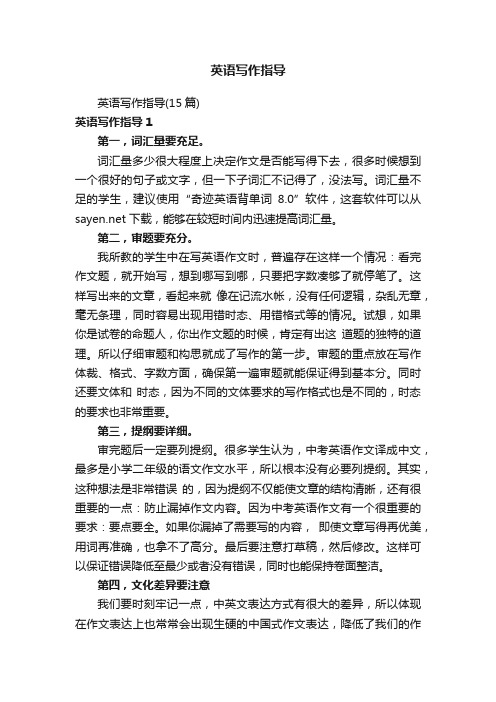
英语写作指导英语写作指导(15篇)英语写作指导1第一,词汇量要充足。
词汇量多少很大程度上决定作文是否能写得下去,很多时候想到一个很好的句子或文字,但一下子词汇不记得了,没法写。
词汇量不足的学生,建议使用“奇迹英语背单词8.0”软件,这套软件可以从 下载,能够在较短时间内迅速提高词汇量。
第二,审题要充分。
我所教的学生中在写英语作文时,普遍存在这样一个情况:看完作文题,就开始写,想到哪写到哪,只要把字数凑够了就停笔了。
这样写出来的文章,看起来就像在记流水帐,没有任何逻辑,杂乱无章,毫无条理,同时容易出现用错时态、用错格式等的情况。
试想,如果你是试卷的命题人,你出作文题的时候,肯定有出这道题的独特的道理。
所以仔细审题和构思就成了写作的第一步。
审题的重点放在写作体裁、格式、字数方面,确保第一遍审题就能保证得到基本分。
同时还要文体和时态,因为不同的文体要求的写作格式也是不同的,时态的要求也非常重要。
第三,提纲要详细。
审完题后一定要列提纲。
很多学生认为,中考英语作文译成中文,最多是小学二年级的语文作文水平,所以根本没有必要列提纲。
其实,这种想法是非常错误的,因为提纲不仅能使文章的结构清晰,还有很重要的一点:防止漏掉作文内容。
因为中考英语作文有一个很重要的要求:要点要全。
如果你漏掉了需要写的内容,即使文章写得再优美,用词再准确,也拿不了高分。
最后要注意打草稿,然后修改。
这样可以保证错误降低至最少或者没有错误,同时也能保持卷面整洁。
第四,文化差异要注意我们要时刻牢记一点,中英文表达方式有很大的差异,所以体现在作文表达上也常常会出现生硬的中国式作文表达,降低了我们的作文质量。
所以注重中英语言差异,并努力找到两者之间的表达方式上的共通点,并且有意识的运用就能避免类似的问题。
最后,细节错误要摒弃。
很多孩子在写作文时常常感觉写得非常好,用上了几个高级句型或者不错的词汇短语,以为可以得高分,但最终结果出来后却与预想差距很大。
小学英语写作技巧
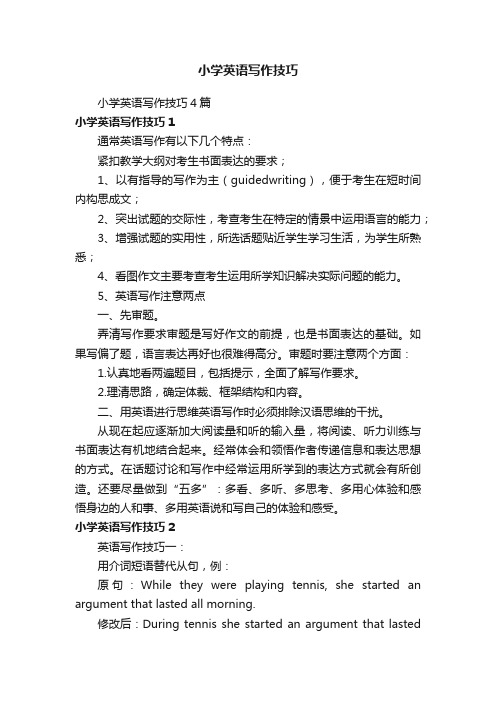
小学英语写作技巧小学英语写作技巧4篇小学英语写作技巧1通常英语写作有以下几个特点:紧扣教学大纲对考生书面表达的要求;1、以有指导的写作为主(guidedwriting),便于考生在短时间内构思成文;2、突出试题的交际性,考查考生在特定的情景中运用语言的能力;3、增强试题的实用性,所选话题贴近学生学习生活,为学生所熟悉;4、看图作文主要考查考生运用所学知识解决实际问题的能力。
5、英语写作注意两点一、先审题。
弄清写作要求审题是写好作文的前提,也是书面表达的基础。
如果写偏了题,语言表达再好也很难得高分。
审题时要注意两个方面:1.认真地看两遍题目,包括提示,全面了解写作要求。
2.理清思路,确定体裁、框架结构和内容。
二、用英语进行思维英语写作时必须排除汉语思维的干扰。
从现在起应逐渐加大阅读量和听的输入量,将阅读、听力训练与书面表达有机地结合起来。
经常体会和领悟作者传递信息和表达思想的方式。
在话题讨论和写作中经常运用所学到的表达方式就会有所创造。
还要尽量做到“五多”:多看、多听、多思考、多用心体验和感悟身边的人和事、多用英语说和写自己的体验和感受。
小学英语写作技巧2英语写作技巧一:用介词短语替代从句,例:原句:While they were playing tennis, she started an argument that lasted all morning.修改后:During tennis she started an argument that lastedall morning.原句:When you come to the second traffic light, turn right.修改后:At the second traffic light turn left.英语写作技巧二:删除诸如"who is”或"that is"类的关系代词,变从句为短语,例:句:The novel, which is written in three parts, told a story that took place in the Middle Ages.修改后:The three-part novel told a story set in the Middle Ages.注:把句中的"three parts"改用形容词来表达,节省了四个不必要的单词"which is written in"。
2020小学英语复习之写作指导(技巧) 附英语作文范文20篇 写作能力的提高
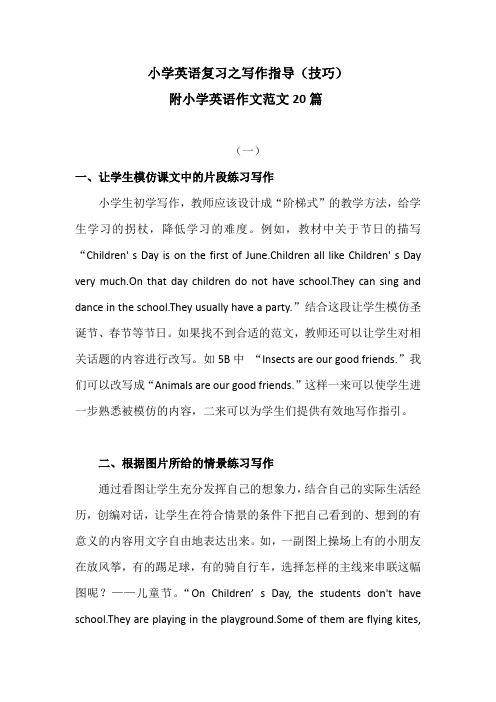
小学英语复习之写作指导(技巧)附小学英语作文范文20篇(一)一、让学生模仿课文中的片段练习写作小学生初学写作,教师应该设计成“阶梯式”的教学方法,给学生学习的拐杖,降低学习的难度。
例如,教材中关于节日的描写“Children' s Day is on the first of June.Children all like Children' s Day very much.On that day children do not have school.They can sing and dance in the school.They usually have a party.”结合这段让学生模仿圣诞节、春节等节日。
如果找不到合适的范文,教师还可以让学生对相关话题的内容进行改写。
如5B中“Insects are our good friends.”我们可以改写成“Animals are our good friends.”这样一来可以使学生进一步熟悉被模仿的内容,二来可以为学生们提供有效地写作指引。
二、根据图片所给的情景练习写作通过看图让学生充分发挥自己的想象力,结合自己的实际生活经历,创编对话,让学生在符合情景的条件下把自己看到的、想到的有意义的内容用文字自由地表达出来。
如,一副图上操场上有的小朋友在放风筝,有的踢足球,有的骑自行车,选择怎样的主线来串联这幅图呢?——儿童节。
“On Children’ s Day, the students don't have school.They are playing in the playground.Some of them are flying kites,some boys are playing football, two girls are riding bikes.They are very happy today!”在看图写作中,教师要选择适当的图片给学生,刚开始接触时,教师要选择一些生动的、活泼的图片给学生,让学生有话可写。
小学学生英语作文写作技巧和方法
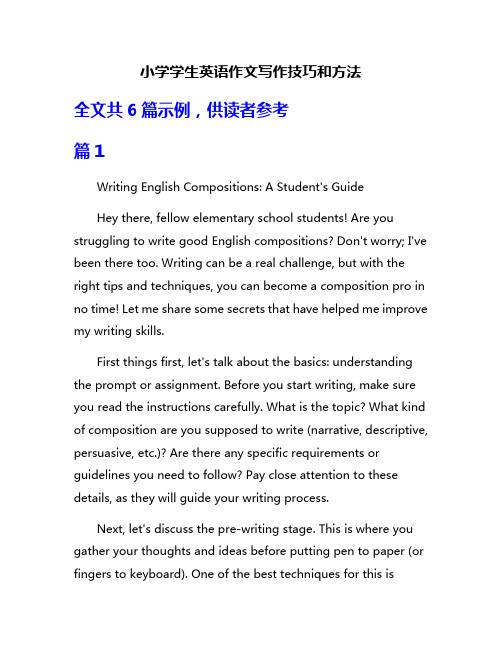
小学学生英语作文写作技巧和方法全文共6篇示例,供读者参考篇1Writing English Compositions: A Student's GuideHey there, fellow elementary school students! Are you struggling to write good English compositions? Don't worry; I've been there too. Writing can be a real challenge, but with the right tips and techniques, you can become a composition pro in no time! Let me share some secrets that have helped me improve my writing skills.First things first, let's talk about the basics: understanding the prompt or assignment. Before you start writing, make sure you read the instructions carefully. What is the topic? What kind of composition are you supposed to write (narrative, descriptive, persuasive, etc.)? Are there any specific requirements or guidelines you need to follow? Pay close attention to these details, as they will guide your writing process.Next, let's discuss the pre-writing stage. This is where you gather your thoughts and ideas before putting pen to paper (or fingers to keyboard). One of the best techniques for this isbrainstorming. Grab a piece of paper or open a new document on your computer, and start jotting down any ideas, thoughts, or words that come to mind related to the topic. Don't worry about making sense or organizing your ideas just yet; this is simply a way to get your creative juices flowing.Another helpful pre-writing strategy is creating a mind map or web diagram. Start with your main topic in the center, and then branch out with related ideas, concepts, or details. This visual representation can help you organize your thoughts and see connections between different aspects of your composition.Once you've gathered your ideas, it's time to start organizing them into an outline. An outline is like a roadmap for your composition; it helps you structure your thoughts and ensures that your writing flows logically from one point to the next. Start with an introduction that captures the reader's attention and provides a brief overview of your topic. Then, divide your main body into several paragraphs, each focusing on a specific point or idea. Finally, wrap it up with a conclusion that summarizes your main points and leaves a lasting impression.Now, let's talk about the actual writing process. When you sit down to write your composition, make sure you have a quiet, distraction-free environment. This will help you stay focused andproductive. As you write, keep your sentences simple and clear. Use language that is easy to understand, and avoid overly complicated words or phrases.Remember to support your ideas with relevant examples, facts, or personal experiences. This will make your composition more engaging and convincing. Additionally, try to incorporate vivid descriptions and sensory details to help your readers visualize and connect with your writing.Once you've finished your first draft, it's time for the editing and revising stage. This is where you fine-tune your composition and make sure it's the best it can be. Start by reading your work aloud; this will help you catch any awkward phrasing or mistakes you may have missed. Then, go through your composition line by line, checking for spelling, grammar, and punctuation errors.Don't be afraid to rearrange sentences or paragraphs if they don't flow well or if you think a different structure would be more effective. You can also ask a friend, family member, or your teacher to read your composition and provide feedback. Fresh eyes can often spot areas for improvement that you may have overlooked.Finally, let's talk about some general tips and tricks for writing better English compositions:Read, read, read! The more you read, the better you'll understand how to structure sentences, use vocabulary effectively, and craft engaging narratives.Keep a journal or diary. Writing regularly, even if it's just about your daily experiences, can help improve your writing skills and build confidence.Don't be afraid to make mistakes. Writing is a learning process, and mistakes are opportunities for growth.Have fun with it! Writing should be an enjoyable experience, so try to choose topics that genuinely interest you.Stay positive and keep practicing. Improvement takes time and effort, but with dedication and persistence, you'll see your writing skills blossom.There you have it, my friends – a comprehensive guide to writing better English compositions. Remember, writing is a craft that takes time and practice to master. But with these tips and techniques under your belt, you'll be well on your way to becoming a composition champion!Happy writing!篇2Certainly! Here's an essay on "English Composition Writing Tips and Techniques for Elementary School Students" written in a language suitable for elementary school students, with a length of approximately 2,000 words.Title: Awesome English Writing Tricks for Kids!Hi there, friends! Are you ready to become a super awesome English writer? Writing can be so much fun, and it's a great way to share your thoughts and ideas with others. Today, I'm going to share some cool tips and tricks that will help you write like a pro!Tip #1: Choose a Rocking TopicThe first step to writing a great piece is to choose a topic that excites you. Think about the things you love, like your favorite video game, a cool adventure you had, or even a funny story about your pet. When you write about something you're passionate about, your words will flow more easily, and your writing will be much more interesting to read.Tip #2: Plan Your WritingBefore you start writing, it's always a good idea to plan what you want to say. You can make a simple outline or draw a mind map with your main ideas and supporting details. Planning helpsyou organize your thoughts and ensures that your writing makes sense from beginning to end.Tip #3: Use Descriptive WordsOne of the best ways to make your writing come alive is to use descriptive words. Instead of saying "the dog was big," you could write "the enormous, furry dog towered over me." By using descriptive words, you'll paint a vivid picture in your reader's mind, making your writing more engaging and enjoyable to read.Tip #4: Show, Don't TellAnother great writing technique is to "show, don't tell." Instead of just telling your readers how someone felt, show them by describing their actions and expressions. For example, instead of saying "Lily was sad," you could write "Tears rolled down Lily's cheeks as she clutched her favorite teddy bear tightly."Tip #5: Use DialogueIncluding dialogue (the spoken words of characters) in your writing can make it more interesting and realistic. Dialogue can also help reveal a character's personality and feelings. Just remember to use quotation marks around the spoken words andinclude a dialogue tag (like "said" or "shouted") to indicate who is speaking.Tip #6: Read, Read, Read!One of the best ways to improve your writing skills is to read as much as you can. When you read books, magazines, or even online articles, pay attention to the way the authors use descriptive language, dialogue, and other writing techniques. You can learn so much from observing how skilled writers craft their stories and essays.Tip #7: Practice Makes PerfectLike any skill, writing takes practice. The more you write, the better you'll become. Try keeping a journal or writing short stories in your free time. You can also participate in writing contests or join a writing club at school. The more you practice, the more comfortable and confident you'll become with expressing yourself through writing.Tip #8: Ask for FeedbackDon't be afraid to share your writing with others and ask for feedback. Your parents, teachers, or friends can provide valuable suggestions on how to improve your writing. They may notice areas where you could add more details, use stronger wordchoices, or clarify your ideas. Feedback can help you identify your strengths and weaknesses as a writer and guide you on how to improve.Tip #9: Edit and ReviseOnce you've finished your first draft, it's time to edit and revise your work. Read through your writing carefully and look for any spelling or grammar mistakes. Check if your ideas flow logically and if you've provided enough details and examples to support your main points. Don't be afraid to make changes –revising is an essential part of the writing process and will help you create a polished, high-quality piece.Tip #10: Have Fun!Last but not least, remember to have fun with your writing! Writing should be an enjoyable experience, not a chore. Let your creativity flow, experiment with different styles and techniques, and don't be afraid to take risks. The more you enjoy the writing process, the better your writing will become.There you have it, friends – ten awesome tips and tricks to help you become a fantastic English writer! Remember, writing is a skill that takes time and practice to develop, so don't getdiscouraged if your first few attempts aren't perfect. Keep writing, keep learning, and most importantly, keep having fun with it!篇3Writing in English - Tips for KidsHi there! My name is Emily and I'm a 5th grader. Writing is one of my favorite things to do, but it can also be really hard sometimes. That's why I want to share some tips that have helped me get better at writing in English.First off, you need to get your brain ready for writing. It's kind of like stretching before you go running. You have to warm up those creative muscles! One thing I like to do is make a mind map or list of ideas for my story or essay. Just write down whatever pops into your head - don't worry about making sense yet. Getting those thoughts out of your brain and onto paper gets you motivated to write more.Next, you need a solid plan for your writing. This is called an outline. It's like a road map that shows where you're going with your story or essay. For a story, I make sure to include the characters, setting, problem, and solution in my outline. For an essay, I write down the main idea, supporting details, andexamples I want to use. Having a good outline keeps your writing organized and on track.Now it's time for the fun part - writing that first draft! Don't think too hard, just let your ideas flow. Use lots of juicy, descriptive words to bring your story or essay to life. If you get stuck, reread your outline or take a short break. This part can be messy, but that's okay! You'll clean it up in the next step.Polishing that rough draft is really important. I like to read through my writing a few times, checking for mistakes and ways to improve it. Does each sentence make sense? Are there better word choices I could use? I'm always making edits to strengthen my writing. It's helpful to have someone else read your draft too and give you feedback.The final step is proofreading carefully to fix any last errors in spelling, grammar, punctuation, and capitalization. I check over my writing super slowly and read every word out loud. This helps me catch silly little mistakes that my brain might overlook. Proofreading makes sure your writing looks polished and professional.Those are my top tips for writing in English! It takes lots of practice, but the more you write, the easier it becomes. Always give it your best effort, and don't be afraid to show off yourcreativity. Writing lets you share your thoughts and stories with the world. How cool is that?I hope these suggestions are useful for you writers out there. Just remember to make an outline, use lots of great details, edit carefully, proofread closely, and have fun with it! Happy writing, everybody!篇4Here are some tips and techniques for writing English compositions as an elementary school student, written in a style appropriate for young students (around 2000 words):Writing Great English Compositions in Elementary SchoolDo you sometimes find it hard to write compositions in English class? Don't worry, I've got some awesome tips to help you become a writing superstar! Just follow these simple techniques and you'll be creating amazing stories and essays in no time.Tip #1: Choose an Exciting TopicThe first step is to pick a fun and interesting topic to write about. Maybe you want to tell a silly story about your family's hilarious pet? Or describe an epic adventure in your favoritefictional world? You could even write about your biggest dreams and goals! The possibilities are endless. If you choose something you feel excited about, the words will flow much easier.Tip #2: Make an OutlineBefore you start writing, it's really helpful to make a plan or an outline. Decide what the beginning, middle, and end of your story will be. Or if you're writing an essay, figure out your main idea and the key supporting details. Having an outline makes the actual writing part way simpler!Tip #3: Use Vivid Word PicturesTo make your writing come alive, you need to paint pictures with your words. Don't just say the tree was big. Say it was a gigantic, towering oak with long twisting branches. Instead of the sun was bright, describe it as a blazing golden orb high in the brilliant blue sky. Using lots of descriptive, colorful words makes your readers feel like they're really there.Tip #4: Show, Don't TellAnother cool writing trick is to show your readers what's happening instead of just telling them. For example, don't write "I was scared." Try something like "My heart pounded in my chest and my palms grew sweaty." See how that makes thefeeling more real and intense? Showing emotions and actions through vivid details captures the story better.Tip #5: Vary Your SentencesBe sure to mix up your sentence styles as you write. Use some short, simple sentences like "I looked everywhere." But also include longer, fancier sentences with adjectives and descriptive phrases. For example: "The vast meadow, covered in a rainbow blanket of wildflowers, stretched endlessly toward the shadowy forest in the distance." Varying your sentences makes your writing more interesting.Tip #6: Use Transition WordsDon't forget to connect your ideas and thoughts together with good transition words. Words like "also," "furthermore," "however," "meanwhile," and "for instance" make your paragraphs flow smoothly. Transitions are like the glue that holds your writing in place.Tip #7: Check Your WorkThe final step is editing and revising your work. First, read through your composition and double-check for any spelling or grammar errors. Then ask yourself if you need to explain things more clearly or use more descriptive language. Don't be afraid torewrite whole sections to improve them. Fixing up your first draft makes your writing even better!Just Keep Writing!Those are some of the most helpful tips for awesome writing. The absolute best advice, though, is to write as much as you possibly can! The more you practice, the easier and more natural it will become. Pretty soon, you'll be cranking out captivating stories and impressive essays without even thinking about it. So what are you waiting for? Grab a pen or pencil and get those creative juices flowing! Happy writing!篇5Writing English Compositions: A Student's GuideHey there, fellow students! Are you finding it hard to write good English compositions? Don't worry; I've been there too. Writing can be challenging, but with the right tips and methods, it can become a lot easier and even fun! Let me share with you some secrets that have helped me improve my composition writing skills.First things first, let's talk about the basics. Before you start writing, you need to understand the purpose of yourcomposition. Are you writing a narrative story, a descriptive essay, or an argumentative piece? Knowing the type of composition you're working on will help you organize your thoughts and ideas better.Next, brainstorming is key! Don't just start writing without any preparation. Spend some time thinking about the topic, jotting down ideas, and making a rough outline. This will help you stay focused and ensure that your composition flows smoothly from one point to the next.Now, let's dive into the actual writing process. The introduction is crucial – it's like the first impression you make on your reader. Start with a hook, something interesting or thought-provoking that will grab their attention. Then, provide some background information about your topic and state your main idea or thesis statement.The body paragraphs are where you'll develop your ideas and support your main point with evidence, examples, and explanations. Each paragraph should focus on one main idea and have a clear topic sentence that introduces the paragraph's main point. Use transition words and phrases to connect your ideas and create a smooth flow between paragraphs.Don't forget to use descriptive language and sensory details to make your writing more vivid and engaging. Painting a picture with your words can help your readers better understand and connect with your ideas.The conclusion is just as important as the introduction. Here, you'll summarize your main points and restate your thesis in a fresh way. You can also leave your readers with a final thought or a call to action related to your topic.Now, let's talk about some writing techniques that can take your compositions to the next level:Show, don't tell: Instead of just stating facts or ideas, use examples, anecdotes, and sensory details to show your readers what you mean. This makes your writing more engaging and memorable.Vary your sentence structure: Don't make all your sentences the same length or structure. Mix it up with short, punchy sentences and longer, more complex ones. This will add rhythm and variety to your writing.Use figurative language: Metaphors, similes, and other figurative language devices can make your writing more descriptive and powerful. Just don't overdo it!Be concise: While you want to provide enough detail and explanation, you also want to be concise and avoid unnecessary wordiness. Say what you need to say in a clear and direct manner.Read your work aloud: This is a great way to catch any awkward phrasing, grammatical errors, or places where your writing doesn't flow smoothly. Reading aloud can also help you identify areas where you need to clarify or expand on your ideas.Remember, writing is a skill that takes practice, so don't get discouraged if your first few attempts aren't perfect. Keep writing, revising, and seeking feedback from your teachers and classmates. Over time, you'll see improvements in your composition writing abilities.One more thing – have fun with it! Writing doesn't have to be a chore. Let your creativity flow, and don't be afraid to experiment with different styles and techniques. The more you enjoy the writing process, the better your compositions will be.So, there you have it – my top tips and methods for writing awesome English compositions. Put these into practice, andyou'll be well on your way to becoming a writing rockstar! Happy writing, my fellow students!篇6Writing English Compositions: Tips and Tricks for Elementary StudentsHey there, fellow elementary students! Are you struggling with writing compositions in English class? Don't worry; we've all been there! Writing can be challenging, but with the right tips and tricks, you can become a composition pro! Let's dive in and explore some helpful strategies to make your writing shine.Brainstorm and PlanBefore you start writing, take some time to brainstorm and plan your composition. Grab a piece of paper or open a new document on your computer, and jot down all the ideas that come to mind. Try making a mind map or a list of key points you want to cover. Planning ahead will help you organize your thoughts and ensure that your composition flows smoothly.Use Interesting VocabularyTo make your writing more engaging, try to use interesting and descriptive words. Instead of saying "nice," you could use words like "delightful," "wonderful," or "magnificent." Don't juststick to basic words; spice up your language to make your composition more enjoyable to read.Show, Don't TellInstead of simply stating facts, try to paint a picture with your words. For example, instead of saying "The weather was good," you could write, "The warm sun kissed my face as a gentle breeze danced through the trees." Using descriptive language and examples will help your readers visualize and connect with your writing.Use Transition WordsTransition words like "first," "next," "additionally," "however," and "finally" can help your composition flow smoothly from one idea to the next. These words act as signposts, guiding your readers through your composition and making it easier to follow your train of thought.Check Your Grammar and SpellingBefore submitting your composition, be sure to proofread it carefully. Look for any mistakes in grammar, spelling, or punctuation. You can ask a classmate, teacher, or parent to help you check your work. Remember, proper grammar and spelling will make your writing look polished and professional.Read Your Writing Out LoudSometimes, it's helpful to read your composition out loud to yourself or to someone else. This can help you catch any awkward phrasing or sentences that don't sound quite right. Reading aloud can also help you identify places where you might need to add more details or clarify your ideas.Get Feedback and ReviseDon't be afraid to ask for feedback from your teacher, classmates, or parents. They may spot areas for improvement that you've missed or offer suggestions to make your writing even better. Be open to constructive criticism and use it to revise and refine your composition.Practice, Practice, PracticeLike any skill, writing takes practice. The more you write, the better you'll become. Try writing short stories, journal entries, or even poems in your spare time. The more you exercise your writing muscles, the easier it will become to express your thoughts and ideas clearly and effectively.Remember, writing is a journey, and you'll continue to improve with each composition you write. Don't get discouraged if your first drafts aren't perfect; that's what revisions are for!Keep these tips and tricks in mind, and you'll be well on your way to becoming an excellent writer in no time.Happy writing, elementary students! Let your creativity flow, and enjoy the process of crafting wonderful compositions in English.。
小学456年级如何写好英文作文范文
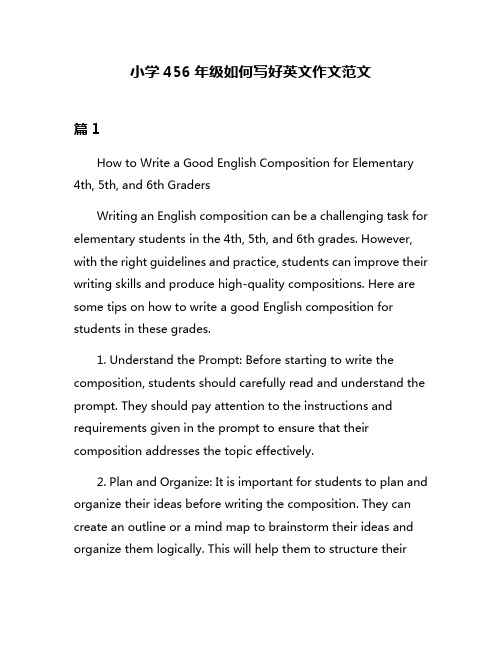
小学456年级如何写好英文作文范文篇1How to Write a Good English Composition for Elementary 4th, 5th, and 6th GradersWriting an English composition can be a challenging task for elementary students in the 4th, 5th, and 6th grades. However, with the right guidelines and practice, students can improve their writing skills and produce high-quality compositions. Here are some tips on how to write a good English composition for students in these grades.1. Understand the Prompt: Before starting to write the composition, students should carefully read and understand the prompt. They should pay attention to the instructions and requirements given in the prompt to ensure that their composition addresses the topic effectively.2. Plan and Organize: It is important for students to plan and organize their ideas before writing the composition. They can create an outline or a mind map to brainstorm their ideas and organize them logically. This will help them to structure theircomposition effectively and ensure that their ideas flow smoothly.3. Introduction: The introduction is the first part of the composition and it should grab the reader's attention. Students can start with a catchy opening sentence or a question to engage the reader. They should also provide background information about the topic and introduce the main idea or argument of the composition.4. Body Paragraphs: The body paragraphs of the composition should present the main ideas and support them with relevant details and examples. Students should use transitional words and phrases to connect their ideas and ensure that their composition is cohesive and coherent.5. Conclusion: The conclusion is the final part of the composition and it should summarize the main points and restate the thesis statement. Students can also provide a closing thought or a call to action to leave a lasting impression on the reader.6. Use Descriptive Language: To make their composition more interesting and engaging, students can use descriptive language to create vivid images in the reader's mind. They canuse adjectives, adverbs, and sensory details to bring their writing to life.7. Edit and Revise: After completing the composition, students should take the time to edit and revise their work. They can check for grammatical errors, spelling mistakes, and punctuation errors. They can also reorganize their ideas and make sure that their composition is well-structured and coherent.8. Seek Feedback: It is important for students to seek feedback from their teachers, peers, or parents. They can ask for suggestions on how to improve their writing and make their composition more effective.By following these tips and practicing regularly, elementary students in the 4th, 5th, and 6th grades can improve their writing skills and write good English compositions. Writing is a skill that can be developed with practice, so students should not be discouraged if their first compositions are not perfect. With perseverance and dedication, they can become proficient writers and excel in their English classes.篇2How to Write a Good English Composition for Primary 4-6 StudentsWriting an English composition can be a challenging task for primary school students, especially those in grades 4 to 6. However, with proper guidance and practice, students can improve their English writing skills and produce high-quality compositions. In this guide, we will provide some tips and strategies on how to write a good English composition for primary 4-6 students.1. Understand the TopicThe first step in writing a good English composition is to understand the topic. Make sure you read the question carefully and identify the key points that need to be addressed in your composition. If you are unsure about the topic, ask your teacher for clarification.2. Plan Your CompositionBefore you start writing, take some time to plan your composition. Think about the main ideas you want to include, as well as the structure of your composition. You may want to create an outline or a mind map to organize your thoughts.3. Use Proper Grammar and VocabularyWhen writing your composition, make sure to use proper grammar and vocabulary. Avoid using slang or informal language and try to use a variety of sentence structures to make your writing more interesting. Use a dictionary or thesaurus to find synonyms for words you already know to help improve your vocabulary.4. Include Descriptive DetailsTo make your composition more engaging, be sure to include descriptive details that will help bring your writing to life. Use adjectives and adverbs to paint a vivid picture for your readers and make them feel like they are a part of the story.5. Revise and Edit Your WorkOnce you have finished writing your composition, take the time to revise and edit your work. Check for spelling and grammatical errors, as well as any inconsistencies in your writing. You may also want to ask a classmate or teacher to review your composition and provide feedback.6. Practice, Practice, PracticeFinally, the key to improving your English writing skills is practice. The more you write, the better you will become. Trywriting compositions on a regular basis and ask for feedback from your teacher or classmates to help you improve.By following these tips and strategies, primary 4-6 students can improve their English writing skills and produce high-quality compositions. Remember, writing is a skill that takes time and practice to master, so don't get discouraged if your compositions are not perfect right away. Keep practicing and you will see improvement over time.篇3How to Write a Good English Composition for 4th, 5th, and 6th Grade Elementary StudentsWriting a good English composition is an important skill for elementary students in the 4th, 5th, and 6th grades. It requires critical thinking, creativity, and a strong command of the English language. Here are some tips on how to write a good English composition for elementary students in these grades:1. Understand the Prompt:Before you start writing your composition, make sure you understand the prompt or topic given to you. Read it carefully and make sure you know what is being asked of you. If you have any doubts, ask your teacher for clarification.2. Brainstorm Ideas:Once you understand the prompt, take some time to brainstorm ideas for your composition. Think about what you want to say and how you want to structure your composition. You can make a mind map or outline to organize your thoughts.3. Write a Strong Introduction:Start your composition with a strong introduction that grabs the reader's attention. You can use a quote, a question, or a surprising fact to hook the reader. Make sure to introduce the topic of your composition and your main point or argument.4. Develop Your Ideas:In the body of your composition, develop your ideas in a logical and organized way. Use paragraphs to separate different ideas and make sure each paragraph focuses on a specific point. Provide examples, evidence, and explanations to support your ideas.5. Use Descriptive Language:To make your composition more engaging and vivid, use descriptive language to paint a picture for your readers. Use adjectives, adverbs, and figurative language to create imagery and evoke emotions.6. Show, Don't Tell:Instead of simply telling your readers what is happening, show them by using descriptive details and specific examples. This will make your composition more interesting and engaging.7. Write a Strong Conclusion:End your composition with a strong conclusion that summarizes your main points and leaves a lasting impression on your readers. You can restate your main argument or idea and leave your readers with a thought-provoking question or statement.8. Proofread and Edit:Before you submit your composition, make sure to proofread and edit it for errors in grammar, punctuation, and spelling. You can also ask a friend, parent, or teacher to read your composition and provide feedback.Writing a good English composition takes practice and patience, but by following these tips, elementary students in the 4th, 5th, and 6th grades can improve their writing skills and create compelling compositions. Remember to be creative, express yourself clearly, and enjoy the process of writing!。
英语作文写作方法指导
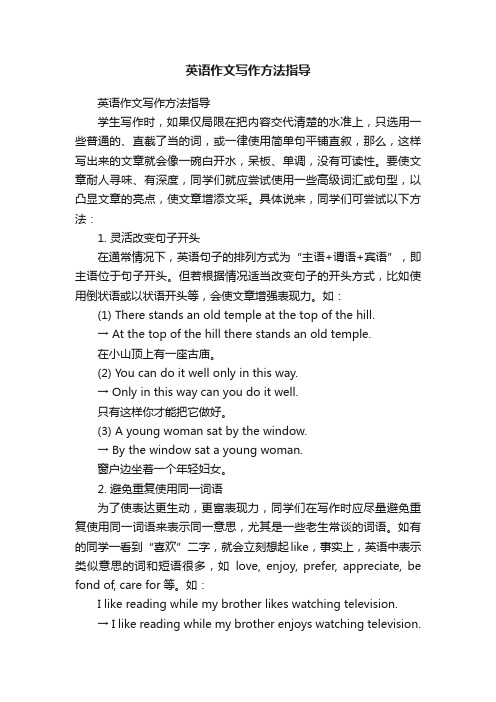
英语作文写作方法指导英语作文写作方法指导学生写作时,如果仅局限在把内容交代清楚的水准上,只选用一些普通的、直截了当的词,或一律使用简单句平铺直叙,那么,这样写出来的文章就会像一碗白开水,呆板、单调,没有可读性。
要使文章耐人寻味、有深度,同学们就应尝试使用一些高级词汇或句型,以凸显文章的亮点,使文章增添文采。
具体说来,同学们可尝试以下方法:1. 灵活改变句子开头在通常情况下,英语句子的排列方式为“主语+谓语+宾语”,即主语位于句子开头。
但若根据情况适当改变句子的开头方式,比如使用倒状语或以状语开头等,会使文章增强表现力。
如:(1) There stands an old temple at the top of the hill.→ At the top of the hill there stands an old temple.在小山顶上有一座古庙。
(2) You can do it well only in this way.→ Only in t his way can you do it well.只有这样你才能把它做好。
(3) A young woman sat by the window.→ By the window sat a young woman.窗户边坐着一个年轻妇女。
2. 避免重复使用同一词语为了使表达更生动,更富表现力,同学们在写作时应尽量避免重复使用同一词语来表示同一意思,尤其是一些老生常谈的词语。
如有的同学一看到“喜欢”二字,就会立刻想起like,事实上,英语中表示类似意思的词和短语很多,如love, enjoy, prefer, appreciate, be fond of, care for等。
如:I like reading while my brother likes watching television.→ I like reading while my brother enjoys watching television.我喜欢看书,而我的兄弟却喜欢看电视。
小学英语作文写作方法指导及范文

小学英语作文写作方法指导及范文小学阶段的英语写作主要考察学生运用所学词汇、句型、语法等内容进行组句成文的能力,是一种考查学生综合运用英语能力的题型。
一、小学生作文当中存在的问题1.立意不鲜明经常看见孩子边写边数“一、二、三……”凑字数现象普遍,或者经常问老师:“写不出来,我能瞎编吗?”有些孩子极度缺乏生活常识或生活经历、也没经典阅读文学的滋养,造成无从下笔,或者写的东西单纯为了搞怪、好玩,没有实质性内容。
建议家长增加孩子的生活阅历和原版阅读,从而先做到“有语意、有观点、有情绪”。
2.结构不完整小学生作文容易结构缺失,常见写着写着,突然结束没有结尾;或者没有开头,让读者莫名其妙…… 小学生作文通常逻辑混乱,思维跳跃,东一句、西一句,内容不关联。
建议先训练“框架式写作”,利用一些连接词理清思路,如:First of all, For a start, In addition… 进而做出取舍,突出闪光点。
对内容进行取舍非常很有必要性的,避免文章冗长、论据雷同、突出文章的重点。
建议训练孩子加强整篇概念:Introduction, Body, Conclusion.即中文所说的“总-分-总”,确保文章的完整性。
3.中式思维小学生作文表达中式思维过重:学生中文思维能力远远超出其英文表达能力,所以出现错句、断句等现象。
不少孩子写作文竟然变成了“中文翻英文”的过程,脑子里面构思的是中文作文,千方百计把它翻译成英文而已。
建议要培养孩子长期原版阅读习惯,积累词汇和形成英文思维,从而缩短当中转换环节。
4.基本功不过关小学生作文单词拼写、语法错误众多:三单错误,时态混乱等等。
建议避开雷区,扎实学好基本语法和句式,并养成检查习惯,进而做到下笔无错。
5.句式单一小学生作文句式太单一:通篇一种到两种句式,即使没有错误,也很难归类到一等作文行列。
如果孩子年龄小,就只会那两种,如简单静态句或进行时,也建议控制好比例,适时转换。
小学阶段英语作文,严格来说叫做“英语写话”,而非“英语写作”,题材也无外乎是关于自己、关于家庭、关于学校、少量关于社会热点话题。
五年级写英语作文的技巧和方法
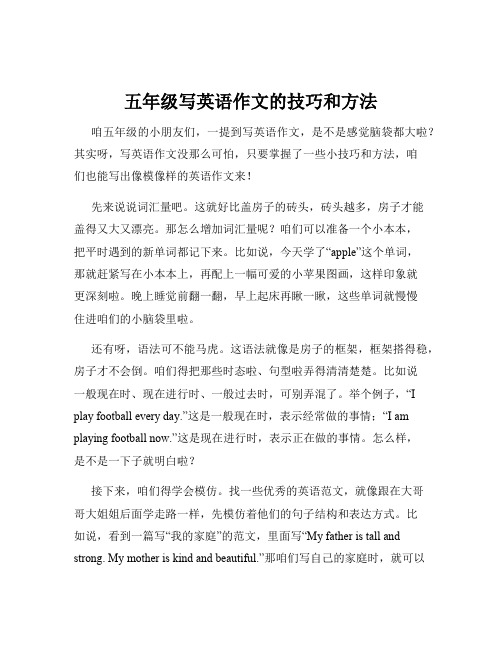
五年级写英语作文的技巧和方法咱五年级的小朋友们,一提到写英语作文,是不是感觉脑袋都大啦?其实呀,写英语作文没那么可怕,只要掌握了一些小技巧和方法,咱们也能写出像模像样的英语作文来!先来说说词汇量吧。
这就好比盖房子的砖头,砖头越多,房子才能盖得又大又漂亮。
那怎么增加词汇量呢?咱们可以准备一个小本本,把平时遇到的新单词都记下来。
比如说,今天学了“apple”这个单词,那就赶紧写在小本本上,再配上一幅可爱的小苹果图画,这样印象就更深刻啦。
晚上睡觉前翻一翻,早上起床再瞅一瞅,这些单词就慢慢住进咱们的小脑袋里啦。
还有呀,语法可不能马虎。
这语法就像是房子的框架,框架搭得稳,房子才不会倒。
咱们得把那些时态啦、句型啦弄得清清楚楚。
比如说一般现在时、现在进行时、一般过去时,可别弄混了。
举个例子,“I play football every day.”这是一般现在时,表示经常做的事情;“I am playing football now.”这是现在进行时,表示正在做的事情。
怎么样,是不是一下子就明白啦?接下来,咱们得学会模仿。
找一些优秀的英语范文,就像跟在大哥哥大姐姐后面学走路一样,先模仿着他们的句子结构和表达方式。
比如说,看到一篇写“我的家庭”的范文,里面写“My father is tall and strong. My mother is kind and beautiful.”那咱们写自己的家庭时,就可以说“My sister is cute and smart. My brother is funny and naughty.” 模仿得多了,自己也就会写啦。
说到这,我想起有一次我们班的英语写作小测试。
老师出的题目是“我的周末”,这可把好多同学难住啦。
有的同学咬着笔头,半天也写不出一个单词;有的同学东瞅瞅西看看,想找点灵感。
我当时心里也有点小紧张,不过我很快就冷静下来啦。
我先在脑子里想了想我周末都干了啥,然后按照咱们学的这些方法来写。
小学英语写作方法和技巧

小学英语写作方法和技巧小学英语写作方法和技巧作文在小学英语考试中占了很大的分值,那么终究怎样做才能写好一篇小学作文呢?以下是英语写作方法和技巧,各位不妨参考和学习下。
要写好英语作文,详细要做到以下几点:注重英文阅读习惯的养成与坚持坚持英语阅读的习惯,不仅可以保持对英语语感的敏感度,更重要的是它有助于培养英式思维,从而防止汉式思维句子的出现。
〔1〕平时多读,积累句型:读的越多,语感欲强烈,写作的时候自然而然就可以自如的运用灵敏多变的句式来完好一篇小作文了,另外建议多积累名言警句、谚语等以作为高级句型运用与作文中。
〔2〕选出一些代表性范文精读:选出不同题材的优秀作文范文,读的时候注意文章的开头、结尾、层次构造以及所用句型等。
要有目的、用学习的心态来精读优秀范文,并做到学以致用。
注重平时的写作训练英语写作训练可以以日记、话题或仿写的.形式来进展。
通过坚持一个学期的英语日记,保持英语写作的习惯。
所以一定要坚持每周两到三次的写作训练,正所谓习惯成自然就是这个道理。
五步写出一篇好作文什么才是好作文呢?很多同学误认为只要像学校平时测验那样子“句子构造正确,无单词拼写错误”就应该得总分值。
而小升初对作文的考核并非如此简单,同学们应该走出对英语写作认识上的误区。
那么除了以上两个方面外,我们怎样才能写出一篇优秀作文而在小升初中获取高分呢?下面就来看我们的“高分作文五步法”。
〔1〕认真审题,确定时态人称,同时关注题材格式时态:故事性文章一般用过去时,其中表达感受时可用如今时。
说明性或议论性文章一般用如今时,举例时可用过去时。
根据题目要求也会出现时态的交织使用,如过去和如今的比照等。
假如句中出现了时间状语,时态那么要遵循时间状语。
如ago,last…过去时;next,in…将来时等人称:注意在句子中人称的统一。
例如:Thanks to the teachers, we have improved our English.其中we和our就是人称的统一。
英语作文写作的方法指导
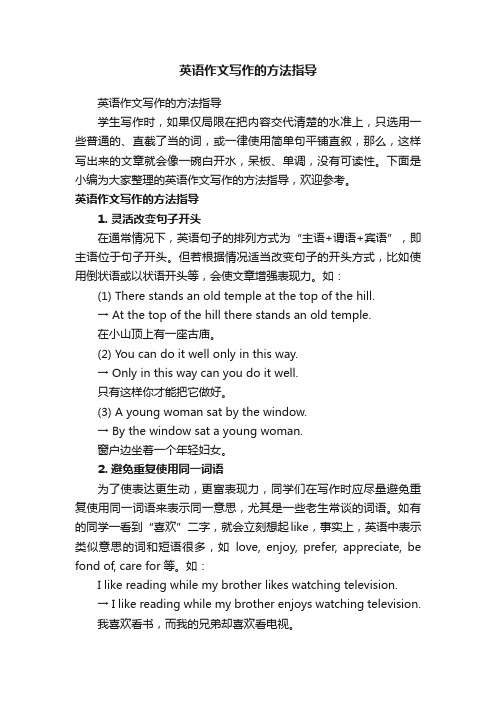
英语作文写作的方法指导英语作文写作的方法指导学生写作时,如果仅局限在把内容交代清楚的水准上,只选用一些普通的、直截了当的词,或一律使用简单句平铺直叙,那么,这样写出来的文章就会像一碗白开水,呆板、单调,没有可读性。
下面是小编为大家整理的英语作文写作的方法指导,欢迎参考。
英语作文写作的方法指导1. 灵活改变句子开头在通常情况下,英语句子的排列方式为“主语+谓语+宾语”,即主语位于句子开头。
但若根据情况适当改变句子的开头方式,比如使用倒状语或以状语开头等,会使文章增强表现力。
如:(1) There stands an old temple at the top of the hill.→ At the top of the hill there stands an old temple.在小山顶上有一座古庙。
(2) You can do it well only in this way.→ Only in this way can you do it w ell.只有这样你才能把它做好。
(3) A young woman sat by the window.→ By the window sat a young woman.窗户边坐着一个年轻妇女。
2. 避免重复使用同一词语为了使表达更生动,更富表现力,同学们在写作时应尽量避免重复使用同一词语来表示同一意思,尤其是一些老生常谈的词语。
如有的同学一看到“喜欢”二字,就会立刻想起like,事实上,英语中表示类似意思的词和短语很多,如love, enjoy, prefer, appreciate, be fond of, care for等。
如:I like reading while my brother likes watching television.→ I like reading while my brother enjoys watching television.我喜欢看书,而我的兄弟却喜欢看电视。
小学英语小作文写作指导
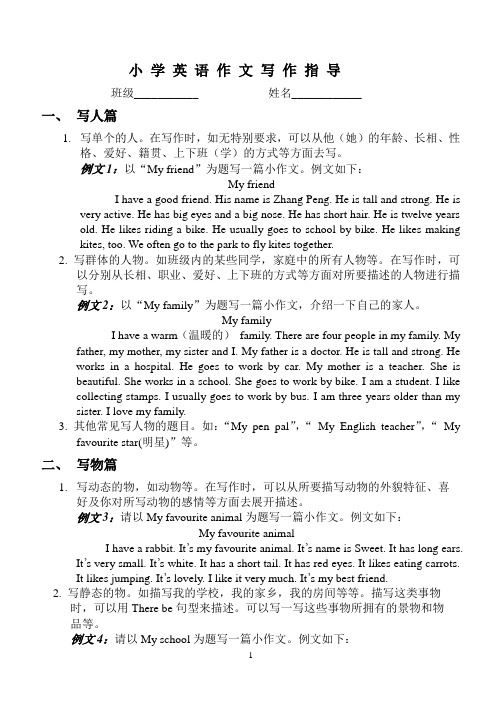
小学英语作文写作指导班级___________ 姓名____________一、写人篇1.写单个的人。
在写作时,如无特别要求,可以从他(她)的年龄、长相、性格、爱好、籍贯、上下班(学)的方式等方面去写。
例文1:以“My friend”为题写一篇小作文。
例文如下:My friendI have a good friend. His name is Zhang Peng. He is tall and strong. He isvery active. He has big eyes and a big nose. He has short hair. He is twelve years old. He likes riding a bike. He usually goes to school by bike. He likes making kites, too. We often go to the park to fly kites together.2. 写群体的人物。
如班级内的某些同学,家庭中的所有人物等。
在写作时,可以分别从长相、职业、爱好、上下班的方式等方面对所要描述的人物进行描写。
例文2:以“My family”为题写一篇小作文,介绍一下自己的家人。
My familyI have a warm(温暖的)family. There are four people in my family. Myfather, my mother, my sister and I. My father is a doctor. He is tall and strong. He works in a hospital. He goes to work by car. My mother is a teacher. She is beautiful. She works in a school. She goes to work by bike. I am a student. I like collecting stamps. I usually goes to work by bus. I am three years older than my sister. I love my family.3. 其他常见写人物的题目。
小学英语写作技巧与方法
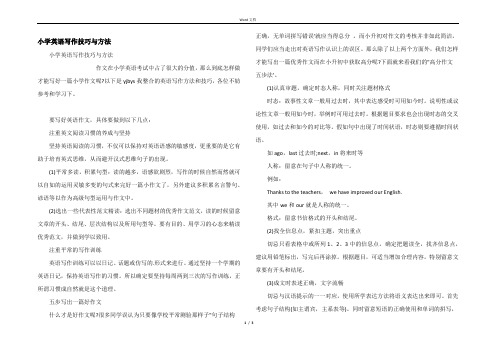
小学英语写作技巧与方法小学英语写作技巧与方法作文在小学英语考试中占了很大的分值,那么到底怎样做才能写好一篇小学作文呢?以下是yjbys我整合的英语写作方法和技巧,各位不妨参考和学习下。
要写好英语作文,具体要做到以下几点:注重英文阅读习惯的养成与坚持坚持英语阅读的习惯,不仅可以保持对英语语感的敏感度,更重要的是它有助于培育英式思维,从而避开汉式思维句子的出现。
(1)平常多读,积累句型:读的越多,语感欲剧烈,写作的时候自然而然就可以自如的运用灵敏多变的句式来完好一篇小作文了,另外建议多积累名言警句、谚语等以作为高级句型运用与作文中。
(2)选出一些代表性范文精读:选出不同题材的优秀作文范文,读的时候留意文章的开头、结尾、层次结构以及所用句型等。
要有目的、用学习的心态来精读优秀范文,并做到学以致用。
注重平常的写作训练英语写作训练可以以日记、话题或仿写的.形式来进行。
通过坚持一个学期的英语日记,保持英语写作的习惯。
所以确定要坚持每周两到三次的写作训练,正所谓习惯成自然就是这个道理。
五步写出一篇好作文什么才是好作文呢?很多同学误认为只要像学校平常测验那样子"句子结构正确,无单词拼写错误'就应当得总分。
而小升初对作文的考核并非如此简洁,同学们应当走出对英语写作认识上的误区。
那么除了以上两个方面外,我们怎样才能写出一篇优秀作文而在小升初中获取高分呢?下面就来看我们的"高分作文五步法'。
(1)认真审题,确定时态人称,同时关注题材格式时态:故事性文章一般用过去时,其中表达感受时可用如今时。
说明性或议论性文章一般用如今时,举例时可用过去时。
根据题目要求也会出现时态的交叉使用,如过去和如今的对比等。
假如句中出现了时间状语,时态则要遵循时间状语。
如ago,last过去时;next,in将来时等人称:留意在句子中人称的统一。
例如:Thanks to the teachers,we have improved our English.其中we和our就是人称的统一。
